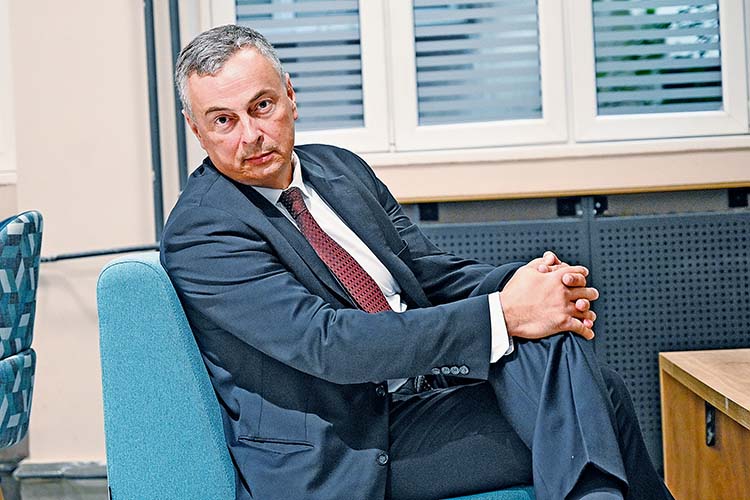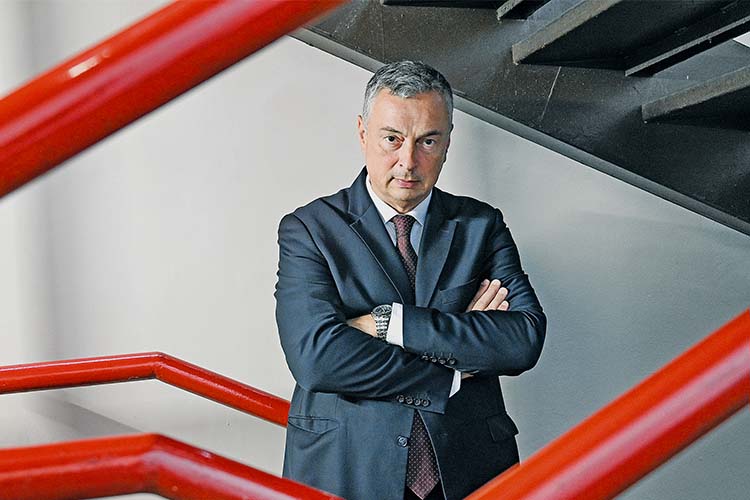I think the war in Ukraine will come to an end soon, as a result of the imbalance of forces on the ground, but also that the political ramifications of the war and sanctions will be felt for a much longer time to come. I believe political change is vital in many countries where politicians have opted for policies that, in the eyes of voters, lead to their social decline over the medium and long term. This could lead to positive changes in international relations, but unfortunately doesn’t necessarily have to
It is a rare year when we think about a coming winter in the way we’re doing today in Europe and in Serbia. And those thoughts range between the seemingly rudimentary – whether we’ll have enough energy, electricity, and whether inflation will continue to rise – to considerations of how the political and economic constellation of the world will look, a constellation that’s being constructed in conjunction with daily news from the Ukrainian front. In this interview with Dejan Šoškić, economist and regular professor at the University of Belgrade Faculty of Economics, we discussed the immediate and long-term ramifications of the conflict in Ukraine, setting out from the assumption that considering the economic impact of the conflict can help us gain a better understanding of its political consequences.
To borrow from the title of a novel, for whom will this be “the winter of our discontent” (Russia, Ukraine, Europe, U.S.) if we take an overview of the situation awaiting us this winter when it comes to gas supply, electricity restrictions, inflation and blows to numerous sectors of the economy?
Pronounced global economic problems had already appeared during the Covid-19 crisis, due to the very sudden shift in the volume and structure of supply and demand that came largely as a result of the measures imposed to protect the population under pandemic conditions. This had the knock-on effect of disrupting some supply chains, causing some fixed costs per unit of production to rise and transport costs to increase markedly, but also led to reduced economic activity in certain sectors, particularly those with a high level of global connectivity in the area of supply and in selling their products. A poor year for agriculture led to rising food prices in 2021, while prices also rose due to reduced supplies of some products as a result of disrupted supply chains, the sudden recovery of demand following the initial waves of the pandemic and rising transport costs. Some time was needed to eliminate these problems, but the outbreak of war in Ukraine and Western sanctions against Russia created reductions and the halting of supplies from Russia, as well as pronounced new supply chain disruptions in certain countries and sectors, with direct consequences in terms of price hikes and reduced economic activity.
The long-term exclusion of Western trade with Russia potentially creates tectonic shifts in the world economy and could lead to the rise of alternative international payment mechanisms, the creation of new reserve currencies, significant differences in the prices of key inputs (energy and food) in different parts of the world market, but also marked reductions in the competitiveness of the West (primarily the EU) on the world market
If we want to take an overview of the consequences of this situation as it relates to the countries you mentioned in your question, and to do so for the coming winter, we could very succinctly and simply state the following: Russia will certainly see reduced economic activity due to broken supply lines with the West, but projections of that economic decline have been reduced from the initial prediction of 20% of GDP to the current level of around 4%. Ukraine has suffered, and will undoubtedly continue to suffer, the greatest damage as a result of the war having destroyed economic facilities and infrastructure, and due to its reduced ability to communicate with the international market, but also due to its huge budget deficit and rising inflation. Europe will gradually enter a recession by the end of the year, with the German economy – as the engine of the entire EU economy – facing increased energy supply problems for its own economy. The U.S., unlike Europe, will not face significant energy supply problems, but it will be hit be an economic slowdown in response to higher energy prices and a restrictive monetary policy aimed at curbing inflation.
If we had to measure how much the world and the individual countries that are closely involved (the U.S., EU, Ukraine, Russia, etc.) are losing this war on the economic front, how would an immediate snapshot and the view of the future look?
It’s difficult to provide this type of forecast because it’s dependent on many factors that are subject to change in a relatively short timeframe. But let’s just say that I wouldn’t be surprised if the U.S. enters a relatively short-lived recession with a somewhat higher inflation rate, only to re-establish sustainably low inflation and return to an economic growth path within a year and a half to two years. In contrast, I think the existing sanctions policy is not only leading the EU into recession, but also into long-term stagnation due to what is likely to be a lasting increase in the price of energy for EU economies, which will cause an enduring decline in their competitiveness at the global level. Simultaneously, levels of public debt in the EU, which are already high, are now heading in the direction of additional increases due to many countries having announced higher defence allocations, which further accentuates financial risk in the domain of the EU’s sovereign debts. Ukraine is undoubtedly suffering and facing the greatest damages.

Not only is it currently experiencing a huge fall in economic activity due to losses in the conflict and its loss of control over territories with significant industrial capacities, but it’s also in the midst of a crisis in public finances, considering that the budget is already being heavily financed through the creation of new money. This could push the country’s inflation to unsustainably high levels in the coming period. If we add to this the enormous increase in the country’s debt from the financing of its war effort, it is quite clear that this country has, unfortunately, already sustained economic collapse. Russia will undoubtedly suffer damages due to the breaking of relations with the West. It is my belief that its economic growth will only return in a few years. However, considering the real size and structure of the Russian economy, the country’s abundance of natural resources and traditionally high scientific and technological knowhow (applied mainly in the domains of defence and aerospace exploration), but also the alternative supply channels it has available from Asia and elsewhere, I think the negative effects on Russia will be short-lived and less pronounced than Western analysts expected when the sanctions were first introduced.
How much does everything that’s happening influence the fundamental reshaping of these markets? In light of the instability preceding both the pandemic and the conflict, is the Ukraine war itself the straw that broke the camel’s back? What do the losses incurred on both sides tell us about the extent to which economic pressure can be a means of achieving peace?
The consequences of the pandemic would have been overcome relatively quickly. The longterm exclusion of Western trade with Russia potentially creates tectonic shifts in the world economy and could lead to the rise of alternative international payment mechanisms, the creation of new reserve currencies, significant differences in the prices of key inputs (energy and food) in different parts of the world market, but also marked reductions in the competitiveness of the West (primarily the EU) on the world market. The policy of imposing sanctions, it seems to me, has always yielded political results that are below expectations. In the case of introdu
Europe will gradually enter a recession by the end of the year, with the German economy – as the engine of the entire EU economy – facing increased energy supply problems for its own economy
cing sanctions against Russia, I think it was the wrong move entirely from the perspective of the actual and long-term interests of the EU, but also the West as a whole.
The economic problems and political aspects of the war are very often debated with a view to the will of voters or the general ire of citizens on both sides of the front. Considering which layers of society actually bear the burden of the conflict, to what extent do they represent a real force for change able to influence political views on the tactics of wearing down the opponent (through drawn out war and sanctions) versus a quick concluding of the conflict?
I think the war itself will come to an end soon, as a result of the imbalance of forces on the ground, but I also think that the political ramifications of the war and sanctions will be felt for a much longer time to come. I believe political change is vital in many countries where politicians have opted for policies that, in the eyes of voters, lead to their social decline over the medium and long term.

That process has already begun in several European countries and I think it will continue in the coming period. This could lead – but unfortunately doesn’t necessarily have to – to positive changes in international relations.
Many multinational companies have withdrawn from Russia after operating on this market for years and investing in it for decades, in some cases since the time of the former Soviet Union. What does the entire operation for Russian owners to takeover those firms mean for the future? Will some autochthonous Russian McDonald’s or Siemens emerge from these transactions; or is the idea to preserve the place of large Western companies on the Russian market? And how realistic are any of these options considering that the sanctions, the U.S. ones in particular, are expected to remain in place for a long time to come?
I don’t think any return to the “old way” in relations between Russia and the West is likely in the near future. Similarly, I think the place of Western companies in Russia will be taken over by existing and new Russian companies, but also foreign companies from elsewhere in the world. At the same time, it wouldn’t surprise me if activities aimed at creatively averting sanctions in certain domains were initiated on the Russian side, but also on the side of the so-called ‘collective West’.
Ukraine has suffered, and will undoubtedly continue to suffer, the greatest damage as a result of the war having destroyed economic facilities and infrastructure, and due to its reduced ability to communicate with the international market, but also due to its huge budget deficit and rising inflation
One equally important topic is the long-term impact of sanctions on Russia’s technological advancement. What do you consider as being a realistic scenario in this context? Could some kind of parallel be drawn with our experiences of sanctions; and what’s now different when it comes to possibly bypassing sanctions or replacing losses with technologies from other countries that haven’t imposed sanctions? How possible is it to switch large production chains based on a single technology to others, or to replace said technologies with local alternatives?
I don’t think that comparisons between the impact of the sanctions imposed on our economy and those now imposed on the Russian economy are based in reality. Coming up with alternatives to broken supply chains is possible, but requires time. We shouldn’t lose sight of the fact that North Korea has succeeded in developing, and continues to develop, its nuclear technology despite long-term Western sanctions. I see enduring obstacles to Russia’s technological advancement primarily if the country neglects the development of its own education system and scientific research institutes.
Unlike many decidedly astounded economists who claimed that the size of Russia’s economy is equivalent to those of Italy or Spain, you used World Bank data to claim that the Russian economy is comparable to those of Germany or France, which now seems to have been grasped by some Western economists who understand why the sanctions imposed to date haven’t worked as intended. When it comes to making your assessments about this war, what do you read and monitor, and what indicators do you pay attention to?
There are many methodological nuances to calculating GDP. The fact that the prices used in some countries to calculate GDP differ significantly from the standard world prices for the goods and services in question, and the fact that the exchange rate used to ascertain the value of GDP in dollars or euros doesn’t partially or fully eliminate these differences, means that a more precise gauge of GDP is created when corrections are applied for purchasing power parity (PPP), and that is recognised as the most realistic measure of GDP among the world’s experts. In the cases of many countries, nominal GDP and PPP GDP don’t differ much or even at all. In the case of Russia, however, these differences are extremely large and PPP GDP ranks Russia sixth worldwide, only around 5% behind Germany, as the world’s fifth largest economy.

Furthermore, the fact that the grey economy and natural production – which are generally more difficult to encompass in calculating GDP – have a significantly higher presence in Russia compared to Germany, provides an argument for some international analysts to claim that the Russian economy is really stronger than Germany’s. Still, if we set out from the data on PPP GDP, which we can source easily from the World Bank or the IMF, and from the fact that this indicator places the Russian economy sixth in the world, that the country produces approximately 4,400 billion dollars a year – around 1,100 billion dollars more than France annually – and that it represents, with the exception of energy, food and artificial fertiliser production, one of the world’s three largest exporters of an entire range of goods and products of mineral origin that are crucial to many branches of industry and high technology, it becomes clear that such an economy cannot be sanctioned without very serious negative consequences for those imposing such sanctions.
| SUBSTITUTION The place of Western companies in Russia will be taken over by existing and new Russian companies, but also foreign companies from elsewhere in the world | LESSONS We shouldn’t lose sight of the fact that North Korea has succeeded in developing, and continues to develop, its nuclear technology despite long-term Western sanctions | REDUCTION Russia will experience reduced economic activity, but projections of the economic decline have been reduced from the initial 20% of GDP to the current level of around 4% |
|---|